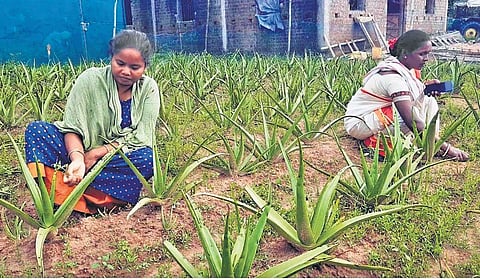

JHARKHAND: Bhagmani Tirkey, her husband Birsa Oraon and other villagers from the hamlet Deori, under Nagri block of Ranchi, managed to survive by cultivating traditional crops in their fields. Then after 2018, their incomes increased and changed their lives.
This happened after the Birsa Agriculture University (BAU), selected Deori for aloe vera cultivation under Tribal Sub Plan funded by Indian Council of Agriculture Research (ICAR). The experts wanted to find out if they could help double the income of a few farmers through medicinal plants. That was something unusual for the state, as most farmers practised single traditional cultivation in their fields.
The region’s agro-climatic conditions were quite suitable for aloe vera, and soon the plant started giving good returns to the chosen villagers. Encouraged, other villagers decided to take up aloe vera cultivation.
Now, Deori is become famous as famous as the ‘aloe vera village.’ Here, the plant grows almost everywhere — in the backyards, kitchen gardens, flowerpots, rooftops and in the fields, which the farmers had kept reserved for the entire year for paddy cultivation.
“I started cultivating aloe vera about three years ago. After it started giving good returns, I planted more saplings on additional land, and now earn thrice as much,” said Birsa Oraon. The initial investment, as compared to other crops, is also very low as after planting it once, one can get the regular produce for the next four years, after 18 months of plantation, he added.
Oraon says the cultivation does not require fertilizers and pesticides, except the cow dung manure. Oraon’s wife Bhagmani Tirkey says that, unlike other traditional crops like cauliflower, tomato and peas, aloe vera does not require additional workforce. “We need only a few hands to remove weeds”. “The only problem is of irrigation in the summers,” said Tirkey. “If we are given proper irrigation facility in the region, we can make even more money as the demand for aloe vera goes up during summers,” she said.
The demand for aloe vera is so high in the market that the farmers are unable to meet it. During the Covid peak when all products witnessed a decline in demand, aloe vera remained unaffected due to its use in making sanitizers, hand washes and immunity boosters.
Village Mukhiya Manju Kacchap recollects how Dr Kausal Kumar of BAU approached her, expressing his willingness to implement the project in the village under tribal sub plan of ICAR. She readily allowed it as she wanted the villagers to earn more. Head of department of forest products and utilisation at the Faculty of Forestry at Birsa Agricultural University in Ranchi, Dr Kaushal Kumar, says he chose Deori for the project as the tribal-dominated village is was ready to adopt new techniques.
Kacchap said around 6,000 aloe vera saplings were distributed to 35 women by BAU, but many of them were skeptical with the idea. Only a dozen of them took it up, while others planted it in their backyards and flowerpots. Very soon, recalled Kacchap, they saw the benefits of shifting to this new cash crop. This motivated other women to also take up planting aloe vera. Prime Minister Narendra Modi made a special mention of her and other villagers for the initiative, she said.